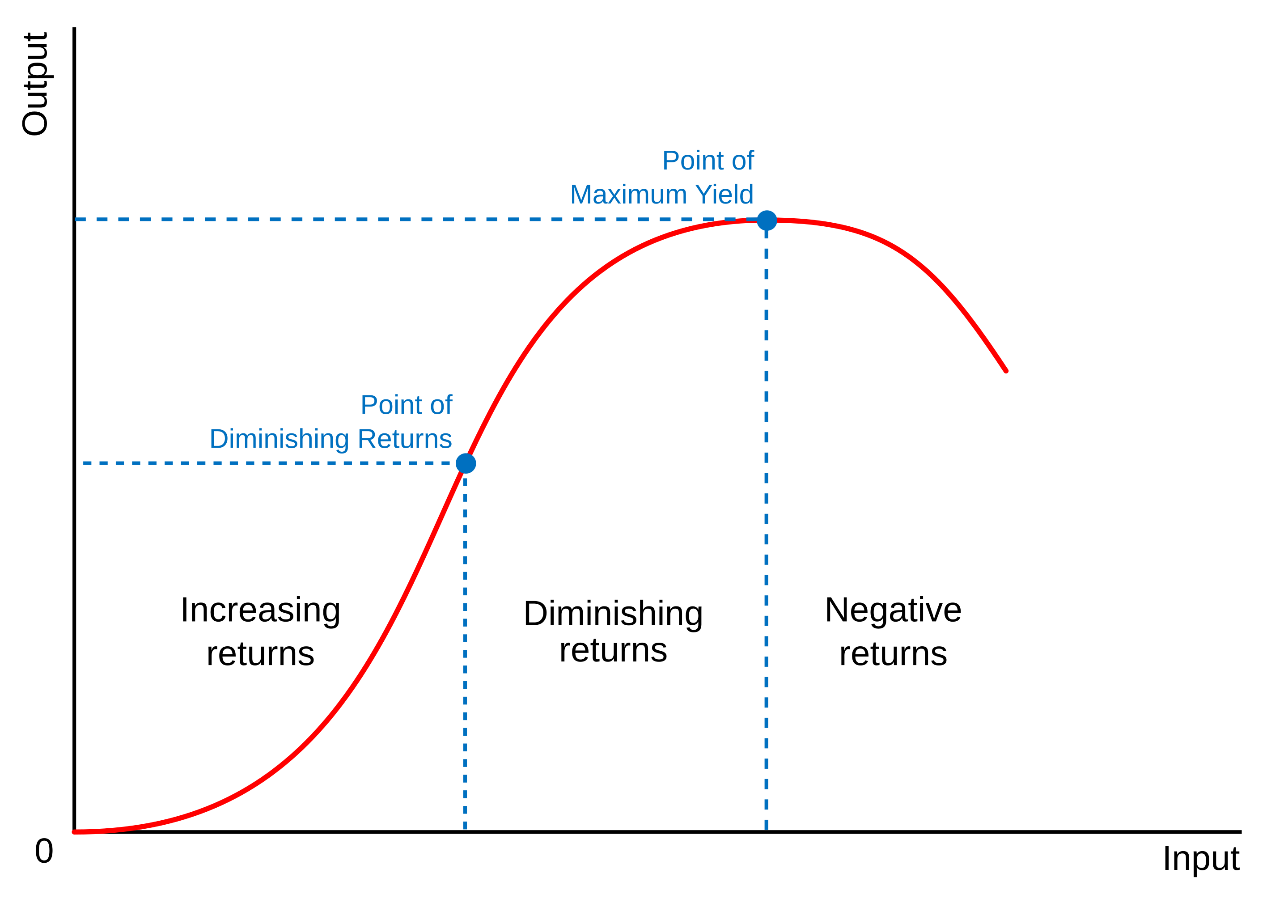Tyler Cowen was interviewed again by Dwarkesh Patel which was recently released (Jan 10):
I listened to it on release and a number of points got me.
One was Cowen’s comment on diminishing returns when it comes to AI.
Here’s a cartoon of diminishing returns from Wikipedia, full credit:

He may have made this point before/elsewhere, but it’s the first time I’ve tripped over it.
I’ve noodled on it for a few days.
Here’s the relevant part of the exchange:
Dwarkesh Patel 00:45:43
The model is that you can have AIs make more AIs, right? That you can have returns.
Tyler Cowen 00:45:47
Ricardo knew this, right? He didn’t call it AI, but Malthus and Ricardo, they all talked about this. It was just humans for them. Well, people then would breed. They would breed at some pretty rapid rate. There were diminishing returns to that.
You had these other scarce factors. Classical economics figured that out. They were too pessimistic, I would say. But they understood the pessimism intrinsic in diminishing returns in a way that people in the Bay Area do not.
And it’s better for them that they don’t know it. But if you’re just trying to inject truth into their veins rather than ambition, diminishing returns is a very important idea.
Dwarkesh Patel 00:46:24
In what sense was that pessimism correct? Because we do have seven billion people, and we have a lot more ideas as a result. We have a lot more industries.
Tyler Cowen 00:46:30
Yeah, I said they were too pessimistic, but they understood something about the logic of diffusion, where if they could see AI today, I don’t think they would be so blown away by it. They’d say, “Oh, you know, I read Malthus.” Ricardo would say, “Malthus and I used to send letters back and forth. We talked about diminishing returns. This will be nice. It’ll extend the frontier, but it’s not going to solve all our problems.”
Could be right?
Am I understanding this correctly?
I ran it by gpt4o to make sure I was not messing things up in my head.
As always, his summary was crystal clear.
Paraphrased and formatted:
Tyler Cowen’s argument reflects on classical economics, specifically the concept of diminishing returns, and applies it to the context of AI and AI-generated AI.
Here’s a summary of his argument and its counterposition to popular belief:
Classical Economics and Diminishing Returns:
- Economists like Ricardo and Malthus discussed diminishing returns in the context of human reproduction and resource limitations. Their idea was that while population growth (or input) can increase output initially, the marginal gains decrease over time due to other constraints (e.g., land or resources).
- Cowen suggests that this same principle applies to AI, particularly the notion that creating AIs that build AIs may also face diminishing returns as additional AIs encounter similar constraints.
Bay Area Optimism vs. Classical Pessimism:
- Cowen contrasts the optimism prevalent in Silicon Valley, where many believe AI progress will scale limitlessly, with the more tempered view of classical economists.
- He posits that the Bay Area’s ambitious outlook ignores the intrinsic limits of compounding gains due to diminishing returns, a truth classical economists recognized even if they were overly pessimistic about humanity’s potential.
Impact on AI Enthusiasm:
- Cowen implies that the exponential growth expected from AIs creating AIs will not solve all societal or technological problems, as some believe.
- While AI may extend the frontier of possibilities, it is not a panacea; limitations will emerge as the system scales.
Classical Economists on AI:
- Cowen speculates that figures like Ricardo and Malthus would not be as surprised by AI’s potential as many modern thinkers are. They would likely view it as an extension of the principles they had already contemplated, with gains that are impactful but ultimately bounded.
Counter to Popular Belief:
The common belief in AI circles, particularly in the Bay Area, is one of boundless exponential growth where AIs recursively improve upon themselves without hitting major roadblocks. Cowen counters this by grounding the discussion in the historical perspective of diminishing returns, suggesting that while progress is real and impactful, it will face inherent limits. This tempered view emphasizes injecting “truth” about constraints into the optimism surrounding AI.
Huh.
The phrasing “intrinsic limits of compounding gains due to diminishing returns” really captures it for me.
Perhaps this time is not different. Perhaps it is. Who knows?
Calm down. There will be limits. Noted.
Related:
- Austrian economics and AI scaling, Tyler Cowen November 14, 2024
From that piece:
I find Matt Clifford’s observation “There is no AI-shaped hole in most organizations” to be a very useful starting point for analysis.
Hmm. From what I see, we do seem to be fractionally replacing engineers piece-by-piece. Other roles will follow.